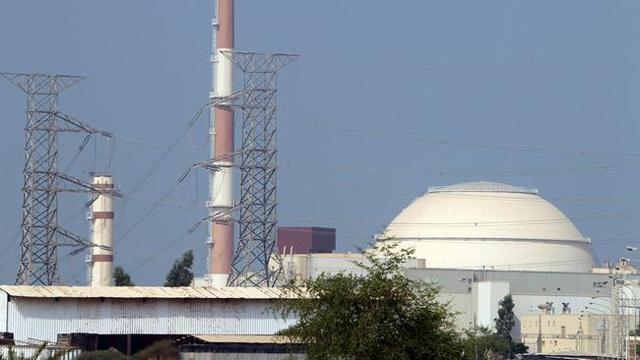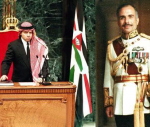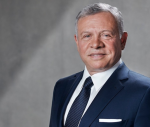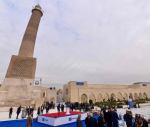You are here
Iran’s Zarif has ‘no concern’ about nuclear deal
By AFP - Jul 28,2015 - Last updated at Jul 28,2015

Iranian Foreign Minister Mohammad Javad Zarif (right) and EU foreign policy chief Federica Mogherini arrive for a press conference in the capital Tehran on Tuesday (AFP photo)
TEHRAN — Iran's foreign minister moved to dismiss concerns Tuesday that his country's nuclear deal with major powers could hit difficulties, saying he had "no concern or worry" about its implementation.
Mohammad Javad Zarif's remarks came during a joint news conference with visiting EU foreign policy chief Federica Mogherini aimed at ensuring that the historic agreement swiftly takes effect.
As the European Union's high representative, Mogherini was intricately involved in the long-running diplomacy, that culminated in a July 14 accord between Iran and six world powers.
Her trip to Tehran came days after US Secretary of State John Kerry was grilled by lawmakers in Washington, who effectively accused him of being duped in the talks by Zarif and Iran's other negotiators.
Republicans in the US Congress, including presidential candidates, have poured scorn on the nuclear deal but they face a monumental battle to overcome President Barack Obama's veto power over any attempt to block it.
Mogherini also met President Hassan Rouhani on Tuesday.
"The same way that efforts were taken for reaching agreement, [we] should concentrate on its accurate and complete implementation so that our nations and all the world enjoy its benefits," Rouhani said.
The past week has seen hardline elements, including the commander of the powerful revolutionary guards force and MPs, raise concerns about the agreement's terms.
Under the deal, Iran must take measures at its nuclear facilities to satisfy UN monitors of their peaceful nature.
In return, the P5+1 powers in the talks — Britain, China, France, Russia and the United States plus Germany — must finalise the mechanism for lifting UN and Western sanctions.
Timeline for implementation
Zarif gave a timeline of "60 to 70 days" for the deal to be settled, following talks with Mogherini about measures that are needed.
"Iran will continue to cooperate with the IAEA," he said, referring to the UN nuclear watchdog.
"I hope the EU and United States will continue to implement their commitments," he added.
Asked about accusations made in some of Iran's conservative media that the agreement breaks supreme leader Ayatollah Ali Khamenei's "red lines", Zarif moved to allay such claims.
"Iran has stuck to its obligations and Iran is going to do the same when it comes to implementing the deal," he said, acknowledging that "some people in Iran have some doubts about some countries, particularly the US, to implement seriously and precisely".
But he added: "I have no concern or worry that the deal will be implemented. I know very well that it is going to be implemented."
MPs recently passed a law forbidding foreigners from entering Iranian military sites, where international monitors have alleged past work on developing nuclear weapons took place.
Although international inspectors have visited Iran's nuclear sites for years, critics have said such restrictions on military facilities will hamper any effective enforcement of the deal.
Iran has always denied seeking an atomic bomb.
'New chapter in relations'
Mogherini flew in from talks in Iran's regional rival Saudi Arabia, whose leaders told her of their deep misgivings about Tehran's intentions.
Riyadh has not publicly condemned the agreement but the deal has come under furious attack by Israel.
Mogherini said that while the accord was on the nuclear issue it could have a broader impact as it was "not the end of a process... it's a beginning".
"It's going to open a new chapter in relations between Iran and the EU," she said, before addressing possibly greater cooperation between Iran and the West on tackling Daesh group militants in Iraq and Syria.
"It is probably one of the most difficult chapters that will be opened," Mogherini said.
"If we manage to adapt to a new understanding this can lead to benefits for all in the region and beyond."
The deal has been broadly welcomed in Tehran with officials lining up to back the government for securing relief from sanctions in exchange for curbs on some, but not all of its nuclear activities.
As the agreement goes under a potentially bruising review in the US Congress, Obama has defended it as the best way to avoid nuclear proliferation and another conflict in the Middle East.
The American president has sought to head off critics of the accord by stressing that it does not preclude military action if Iran welches on its side of the bargain, comments that were received frostily in Tehran.
Related Articles
TEHRAN — Iran said Sunday it had held "fruitful discussions" with UN nuclear watchdog chief Rafael Grossi in Tehran, ahead of a deadline whe
Iran will resume talks with world powers on a final nuclear agreement on April 21 and is ready to take "irreversible steps" if the West does the same, Iranian Foreign Minister Mohammad Javad Zarif said Tuesday in Spain.
After marathon negotiations, the United States, Iran and five other world powers announced a deal Thursday outlining limits on Iran's nuclear programme so it cannot lead to atomic weapons, directing negotiators toward a comprehensive agreement within three months.
















